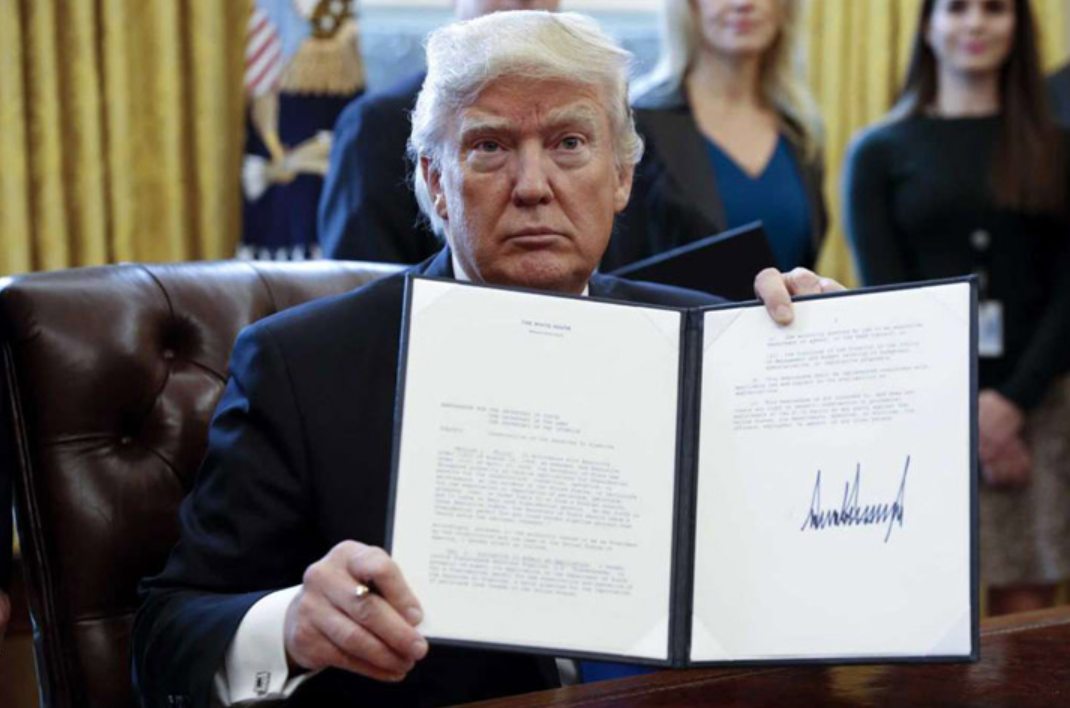Americas
How Trump’s ‘Big Beautiful’ Bill Is Going To Devastate Kenyans in Diaspora

A new remittance tax threatens to upend the financial lifeline that over 100,000 Kenyans in America provide to their families back home
NAIROBI, Kenya – In a cramped apartment in Nairobi’s Kibera slum, 67-year-old Grace Wanjiku clutches her mobile phone, waiting for the familiar beep that signals money has arrived from her son in Boston.
For the past eight years, these monthly transfers of $300 have meant the difference between survival and destitution—covering her medication, rent, and groceries.
But come January 2026, that lifeline could shrink dramatically.
President Donald Trump’s signature on July 4th of what he calls the “One Big Beautiful Bill” has set in motion a seismic shift that will ripple through millions of households across Kenya and the developing world. The legislation, which squeaked through Congress after intense Republican lobbying, introduces America’s first-ever national tax on remittances—the money migrants send home to their families.
The Numbers Tell a Devastating Story
The mathematics are stark and unforgiving. Kenya received $2.63 billion in remittances from the United States in 2024, accounting for more than half of the country’s total diaspora inflows of $4.95 billion.
Kenya’s economic resilience continues to be underpinned by the unwavering support of its vast diaspora, as remittances hit a remarkable US$440.08 million in May 2025, making it the second-largest monthly inflow on record.
Under the new law, every dollar sent through formal channels—banks, Western Union, MoneyGram, and money transfer apps—will be subject to a 1% excise tax. While this might seem modest, the cumulative impact threatens to extract over $26 million annually from the Kenyan-American community alone.
“This isn’t just about numbers on a spreadsheet,” says Dr. Shem Ochuodho, global chairman of the Kenya Diaspora Alliance.
“This is about families who depend on these transfers for basic survival—school fees, medical bills, food. The Trump administration is essentially taxing poverty alleviation.”
From 5% to 1%: A Political Compromise with Real Consequences
The journey of this legislation through Congress reveals the raw political calculations behind what affects millions of lives.
Initially proposed at a punitive 5% rate, the tax was negotiated down to 3.5% by the House of Representatives before the Senate further reduced it to 1%.
The rollback follows mounting concerns among the Indian diaspora after the 5 per cent proposal sparked widespread anxiety.
India, after all, is the largest recipient of global remittances. The lobbying pressure from larger diaspora communities, particularly from India, played a crucial role in the reduction.
Yet even at 1%, the impact on Kenyan families remains profound.
Consider the typical monthly transfer of $500 from a Kenyan nurse working in Houston to her family in Mombasa.
Under the new tax, $5 will be skimmed off before the money even leaves American shores. Over a year, that’s $60—enough to cover a month’s worth of groceries for a family of four in many parts of Kenya.
The Ripple Effect Across Kenya’s Economy
The implications extend far beyond individual households. Remittances have become a cornerstone of Kenya’s economic stability, surpassing foreign direct investment and often proving more reliable than aid flows.
This is higher than total foreign direct investment flows estimated at $1.504 billion (Sh194.02 billion) in 2023.
The Central Bank of Kenya has watched with growing concern as remittances have become integral to the country’s balance of payments.
Any disruption to these flows could have cascading effects on the shilling’s stability, import capacity, and overall economic growth.
Small businesses across Kenya have also built their models around the predictable flow of diaspora money.
From mobile money agents in rural areas to foreign exchange bureaus in Nairobi, an entire ecosystem has evolved around these transfers. The new tax threatens to destabilize this network.
Perhaps most concerning for policy makers is the likely shift toward informal channels. Moreover, research shows that taxing remittances leads to increased use of underground or informal channels for sending money.
That is, senders seek out alternatives—less regulated, less transparent, and less safe ways of transferring their money abroad.
Dr. Ochuodho warns of this dangerous trend: “Remember, tax evasion is illegal, but tax avoidance isn’t. Some people will likely move to cryptocurrencies—and the world is moving in that direction.”
The hawala system, an informal money transfer network that has operated for centuries, could see a resurgence.
While efficient, these systems operate outside regulatory frameworks, making them vulnerable to abuse and removing the transparency that formal channels provide.
Kenya is not alone in facing this challenge. In countries like Nigeria, Ghana, Kenya, and Ethiopia, remittances account for a significant portion of GDP, often surpassing foreign direct investment and aid flows.
The tax represents a fundamental shift in how America views its relationship with the global diaspora.
The legislation is part of Trump’s broader immigration and border security agenda, with proceeds earmarked for enforcement activities.
President Trump’s “big, beautiful bill,” which has passed the House of Representatives, includes a 3.5 percent tax on remittances, money migrants send home to family and friends.
The Human Cost of Policy
Back in Kibera, Grace Wanjiku represents the human face of this policy shift.
Her son David, a certified nurse assistant in Boston, has been sending money home since 2016.
The new tax means he’ll need to choose between reducing the amount he sends or absorbing the additional cost from his already stretched budget.
“I came to America to build a better life for my family,” David says via WhatsApp.
“Now I’m being punished for helping my mother survive. It feels like they’re telling us that caring for our families is a luxury we can’t afford.”
The cruel irony is that many Kenyans in the diaspora are performing essential work in America—as healthcare workers, teachers, and skilled professionals.
They contribute to Social Security, pay federal and state taxes, and participate fully in American society. Yet they’re being penalized for maintaining connections to their homeland.
The tax will take effect on January 1, 2026, giving remittance service providers time to update their systems and train staff.
Remittance providers will have until the end of 2025 to update their systems and train staff to comply with the new requirements.
Kenyan diaspora organizations are mobilizing resistance efforts, planning legal challenges and lobbying campaigns.
They’re particularly focused on the 2026 midterm elections, hoping that a shift in Congressional composition might lead to the tax’s repeal.
“Our only hope is that with the upcoming mid-term elections, more Democrats could be elected to the House and reverse it,” Dr. Ochuodho notes, though he acknowledges the uphill battle ahead.
Economic Experts Weigh In
International tax experts have criticized the measure as economically counterproductive.
Hadijah Nannyomo, a partner for international trade and indirect taxes at EY, points out that the tax violates basic principles of taxation by applying to the quantum of money transferred rather than the service fee.
“Sending less would have an impact on the receiving households, limiting the capacity to save, and in turn may increase the intention to migrate,” said Orozco, who also serves as a senior fellow at Harvard University’s Center for International Development.
The paradox is evident: a tax designed to strengthen border security might actually increase migration pressure by destabilizing the very communities that currently provide alternatives to emigration.
From a development standpoint, the remittance tax runs counter to international goals for reducing the cost of money transfers.
The UN’s Sustainable Development Goals target reducing remittance costs to 3% of the transfer amount, yet the new tax effectively moves in the opposite direction.
Currently, Kenyans in the diaspora already face high transfer costs, with some providers charging up to 9% to send money home.
The additional 1% tax will push total costs even higher, potentially pricing out smaller, more frequent transfers that often matter most to struggling families.
Trump’s “Big Beautiful Bill” sends a clear message about America’s changing relationship with its immigrant communities.
For Kenyans who have built lives in America while maintaining strong ties to home, the message is particularly stark: your contributions are welcome, but your connections to family are taxable.
The legislation represents more than just a fiscal policy—it’s a statement about who belongs and who doesn’t, about which kinds of international connections are valued and which are seen as problems to be solved.
As Grace Wanjiku in Kibera prepares for potentially smaller transfers from her son, and as David in Boston calculates whether he can afford to absorb the additional cost, the human impact of policy decisions becomes crystal clear.
The “Big Beautiful Bill” may deliver on its promise of generating revenue for border security, but it does so by taxing the love and obligation that drive children to care for their parents across oceans.
The coming months will test the resilience of these transnational family networks and the creativity of communities in adapting to new realities.
One thing is certain: the bonds between Kenyans in America and their families at home will endure, even as the cost of maintaining them continues to rise.
The real question is whether American policy makers will recognize the human cost of their “beautiful” legislation—or if they’ll continue to view the diaspora’s devotion to family as just another source of government revenue.
Kenya Insights allows guest blogging, if you want to be published on Kenya’s most authoritative and accurate blog, have an expose, news TIPS, story angles, human interest stories, drop us an email on [email protected] or via Telegram
-

 Business1 week ago
Business1 week agoEastleigh Businessman Accused of Sh296 Million Theft, Money Laundering Scandal
-

 Investigations1 week ago
Investigations1 week agoInside Nairobi Firm Used To Launder Millions From Minnesota Sh39 Billion Fraud
-

 Business1 week ago
Business1 week agoMost Safaricom Customers Feel They’re Being Conned By Their Billing System
-

 Business1 week ago
Business1 week agoEXPLOSIVE: BBS Mall Owner Wants Gachagua Reprimanded After Linking Him To Money Laundering, Minnesota Fraud
-

 News7 days ago
News7 days agoUnfit for Office: The Damning Case Against NCA Boss Maurice Akech as Bodies Pile Up
-

 News1 week ago
News1 week agoTax Payers Could Lose Millions in KWS Sh710 Insurance Tender Scam As Rot in The Agency Gets Exposed Further
-

 News1 week ago
News1 week agoPastor James Irungu Collapses After 79 Hours Into 80-Hour Tree-Hugging Challenge, Rushed to Hospital
-

 News7 days ago
News7 days agoDeath Traps: Nairobi Sitting on a Time Bomb as 85 Per Cent of Buildings Risk Collapse














